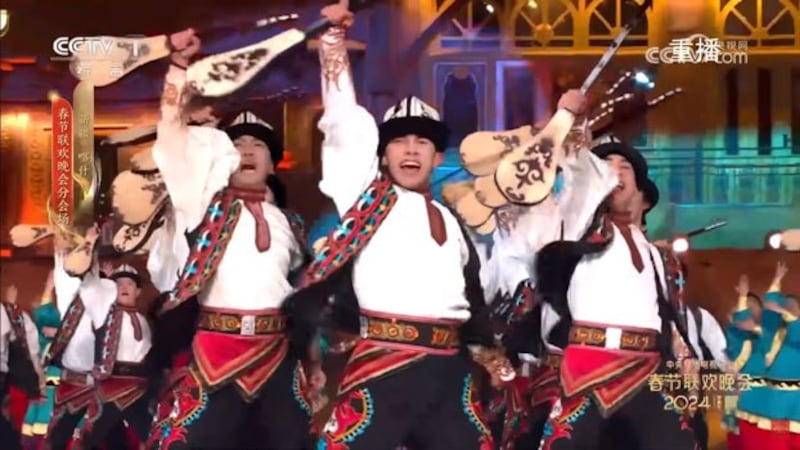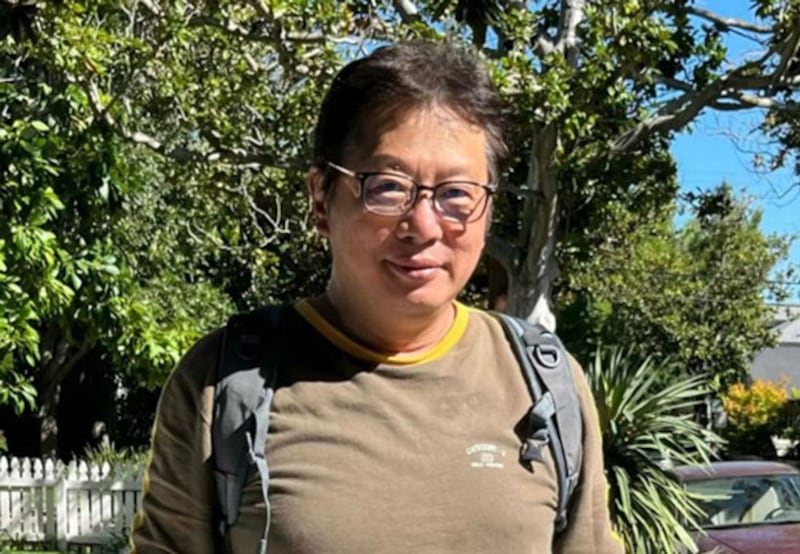For the first time, China’s state broadcaster filmed a portion of its must-watch Lunar New Year TV gala live from the far-western region of Xinjiang, featuring a famous Uyghur actress and dozens of dancers performing a medley of songs.
The six-minute segment, "Dance Music from Xinjiang” – set in the historic city of Kashgar, once a Silk Road trading post – was meant to show “the cultural diversity and beauty of this region through its folk songs & dances," foreign ministry spokeswoman Hua Chunying said on X.
Except that very little of the segment was actually Uyghur. The mostly Muslim Uyghurs traditionally don't even celebrate the Lunar New Year, also known as the Spring Festival.
The songs were sung in Mandarin, the dances were not authentically Uyghur and the performers’ costumes were more Middle Eastern in style, members of the Uyghur diaspora told Radio Free Asia.
Plus, the segment starred Dilraba Dilmurat, a Beijing-backed Uyghur actress regarded by many overseas Uyghurs as a propaganda mouthpiece for the Chinese government. The headpiece she wore was also not culturally authentic.
'Relentless smiling'
Far from celebrating Uyghur culture, the segment was criticized by advocates as a bid to erase it.
“This kind of relentless smiling and dancing is in itself a form of forced labor,” said Rachel Harris, an ethnomusicologist at University of London’s School of Oriental and African Studies whose research focuses on Uyghur music.
“I don't see any kind of real expression of freedom and joy in what I [saw] on the stage there,” she said. Instead, it was “the latest in a long Chinese Communist Party tradition of portraying the ethnic minority peoples as happy and belonging to the People’s Republic.”
“I really feel that the greater the repression, the more lavish the spectacle,” she said. “There seems to be a kind of proportion going on there.”

Because Kashgar is the heart of Uyghur culture, broadcasting the Spring Festival gala from the city implies an enforced acceptance of Han Chinese festivities, “making the locals feel displaced, as if living in China means living as Han Chinese," Norway-based Uyghur activist and Kashgar native Abduweli Ayup told Radio Free Asia.
"It is immensely distressing for a Uyghur to be coerced into assimilating into Han culture overnight, akin to forcing them to consume pork," he said, forbidden in Islam – which Chinese have pressured Uyghurs to eat.
‘Look at this’
Chinese officials, however, claimed the segment negated criticism of Beijing’s policies in the region.
"Anyone who smeared China as 'marginalizing' ethnic minorities should look at this," former editor of the state-run Global Times editor Hu Xijin wrote on X. "On the top stage of China's 2024 Spring Festival Gala, girls from #Xinjiang are gorgeous, and traditional #Tibetan culture was fully displayed."
In a gushing portrait that lauded Dilraba's "exotic" beauty ahead of the Spring Festival gala, the Alibaba-owned South China Morning Post said the 31-year-old actress has more than 80 million followers on Weibo and earned more than US$500 million in endorsements in 2019.
"Her talents are held in such high regard that she has even been complimented on her dancing by the country’s foreign ministry," the paper said, adding that she has won a Golden Eagle Award for best actress for her portrayal of a woman with a dual personality in the series "Kela Lover" in 2015.
During the segment, one Chinese singer sang about the beauty of Uyghur women while Dilraba danced – rather jarring amid eyewitness accounts of forced sterilization, organized rape, and forced marriage of Uyghur women that have come from former victims and inmates at concentration camps that China has installed across Xinjiang.

An estimated 1.8 million Uyghurs and other Turkic minorities have been put in such camps – which Beijing said are vocational centers that have since been closed – where they are subjected to forced labor.
The United States and other governments have branded China’s persecution of the Uyghurs and other Turkic minorities a genocide, and an exhaustive United Nations investigation concluded that China’s treatment of the Uyghurs may amount to crimes against humanity.
Ethnic unity campaigns
Far from celebrating Uyghur culture, Chinese authorities have sought to diminish and even eradicate Uyghur culture and customs – a part of its broader “Sinicization” campaign.
They have targeted Muslim communities with " ethnic unity" campaigns under which Han Chinese "relatives" are imposed on Uyghur families who put pressure on them to observe non-Muslim traditions, including drinking alcohol, eating pork and celebrating Chinese festivals.
In fact, Beijing chose Kashgar as a site to celebrate the Lunar New Year so it could show that its Sinicization policies in Xinjiang have been successful, said David Tobin, a lecturer on East Asian studies at the University of Sheffield in the United Kingdom.
“Presenting Kashgar as a site of Chinese civilization – a city that is closer to Baghdad than to Beijing – is a means to communicate to the outside world and to the Uyghur people that it has always been part of China’s territory and was always part of Chinese civilization, despite the fact that the city has been majority Uyghur and a site of many important religious sites for centuries,” he said.
The show depicts Sinicization as a “benevolent practice by showing that Uyghurs wish to participate in the gala, that they wish to sing and dance happily,” said Tobin.
“This is part of the Communist Party story of China as a benevolent force that includes minorities, but converts them to show that China is not a violent power, [and] it’s directly related to the mass state violence and arbitrary detentions that accelerated under Xi Jinping in 2017,” he said.

According to the gala’s production team, the sets were designed to "blend the architectural essence of Kashgar's ancient city with the stage," allowing the audience to feel immersed in the city's ancient lifestyle while modernizing the millennia-old city through strategic lighting and stage design.
But Abduweli Ayup dismissed the set design as "a faux castle crafted by artificial intelligence," however.
Victory against ‘terrorism’
Beijing is hoping to highlight the "success" of its suppression of Uyghur culture in Xinjiang as a victory against "terrorism" – a term it applies to Uyghurs who engage in normal behaviors like reading the Quran and wearing veils or growing beards, said Taiwan national security researcher and Islamic scholar Shih Chien-yu.
"There has never been a Spring Festival Gala stage in Xinjiang before, not in Urumqi nor Kashgar," Shih said. "This new development signals Beijing's confidence in its local 'counter-terrorism' efforts."
"From a propaganda perspective, the aim is to show overseas Uyghurs and even foreign governments that the re-education camps in Xinjiang are a thing of the past, and societal tensions have been alleviated," he said.

Shih hit out at what he termed "the deliberate stylization and commercialization of Uyghur culture" in the show.
"Kashgar's ... residential areas were once integral to local life, akin to Mong Kok in Hong Kong or Ximending in Taipei," he said. "Now, the authorities have turned these areas into tourist attractions, historical remnants, sending the message to local people that their history and traditions no longer exist."
"The subtext is that one can reminisce about the past through dance and historical rituals, and maybe the locals keep speaking their language, but ultimately, they are a part of China," Shih said.
Henryk Szadziewski, director of research at the Uyghur Human Rights Project, said CCTV's New Year's Gala and the commentary by Global Times editor Hu Xijin were meant to "tell the world that Chinese government policies targeting Uyghurs have been successful, that Uyghurs have been cleansed of their extremism."
“And China believes that they have done it in some kind of humane way,” he said.
Translated by Luisetta Mudie. Edited by Roseanne Gerin and Malcolm Foster.
